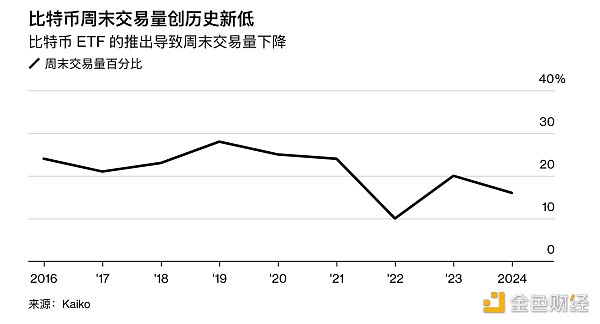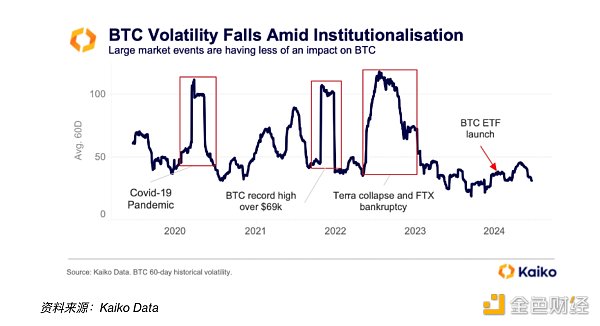Author: Benjamin Taubman Source: Bloomberg Translation: Shan Ouba, Jinse Finance
Data from cryptocurrency research firm Kaiko shows that the proportion of Bitcoin traded on weekends has fallen to an all-time low of 16% this year.
The drop comes after the launch of a spot bitcoin exchange-traded fund that appears to have changed the bitcoin trading schedule to more closely match that of traditional stock exchanges and reduce price volatility. A notable feature of cryptocurrencies is that, unlike stocks, they can be traded around the clock, even on Saturdays and Sundays. In the past, bitcoin trading has been notorious for its "crazy weekends," during which the digital currency's price can fluctuate wildly.
But the phenomenon seems to be cooling down, as Bitcoin weekend trading volume has continued to decline from its 28% high in 2019. The launch of a Bitcoin ETF may be one of the important reasons.
Dessislava Aubert, senior analyst at Kaiko, said the decline in weekend trading is a "trend that has been going on for years, but ETFs have exacerbated it."

In early 2024, the Bitcoin ETF was approved by the U.S. Securities and Exchange Commission and has been sought after by investors since then, causing the price of Bitcoin to soar to an all-time high in March. Although some of the gains have been reduced, the largest cryptocurrency is still up about 45% this year to about $61,000.
Unlike most crypto tokens that can be traded at any time on exchanges like Binance, the Bitcoin ETF follows the schedule of the traditional stock exchanges on which it trades — meaning no weekend trading.
The share of Bitcoin traded between 3pm and 4pm on weekdays rose to 6.7% in the fourth quarter of 2023 from 4.5%. This period of time is called the benchmark pricing window, during which ETF owners determine the price of Bitcoin and then use it to calculate the net asset value of the ETF.
The collapse of crypto-friendly banks Silicon Valley Bank and Signature Bank in March 2023 also led to a drop in weekend trading volumes. This was because market makers could no longer use the banks’ 24/7 payment networks to buy and sell cryptocurrencies in real time.
The report noted: Weekend-weekend price differences are likely to persist because market makers derive their income from high volumes of trading, earning the bid-ask spread, and in a low volume environment, market makers have less incentive to provide liquidity.
Another report from Kaiko said that institutional adoption of cryptocurrencies through Bitcoin ETFs has also led to a significant reduction in price volatility.
When Bitcoin last hit an all-time high in November 2021, volatility spiked to nearly 106%. After Bitcoin hit an all-time high of $73,798 in March, driven by optimism about ETFs, volatility was just 40%.

The trend towards lower volatility, and the fact that it has remained below 50% since the beginning of 2023, suggests that Bitcoin is becoming a more mature asset. While it is too early to say this is the new normal, changes in Bitcoin’s market structure over the past year may help explain the relatively ‘boring’ price action.”







